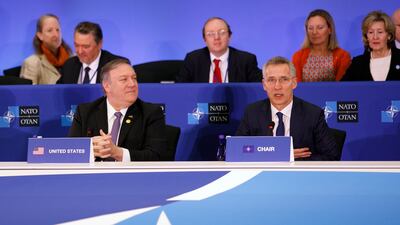The North Atlantic Treaty Organisation turned 70 on April 4 and, to mark the occasion, leaders of its 29 member states were scheduled to convene in Washington to mark the occasion. But invitations were downgraded to foreign ministers, reportedly amid fears that Donald Trump would further attack the alliance. When Nato began life in 1949, it was seen as the cornerstone of defence against the Soviet Union. Since then, the world’s strongest military alliance has been a key deterrent to foreign incursions in Europe and North America. Nevertheless, Mr Trump has been a vocal critic, calling the organisation “obsolete” and pointing out that wealthy members such as Germany fail to share the financial burden of Nato. The truth is that Nato is as important and necessary now as it was before the collapse of the Soviet Union, not least for the Middle East.
Today, Russia remains a preoccupation of the alliance – especially after the annexation of Crimea in 2014 which sparked an ongoing war in the east of Ukraine. But its influence also extends to this region, where it has bulwarked the Syrian government, a regime notorious for its brutality and ties to Iran. Meanwhile, Turkey’s membership of Nato since 1952 has traditionally helped bridge the gap between east and west, supporting Middle East stability. Today, ties between the US and Turkey under Recep Tayyip Erdogan are rapidly deteriorating, pushing Ankara towards Moscow and endangering the Nato alliance at large. The latest dispute concerns Turkey’s refusal to back down over a high-profile arms deal with Russia, while it simultaneously participates in Nato’s F-35 jet fighter programme. At the same time, US allies in Syria, chiefly the Kurdish People’s Protection Units, have found themselves under threat from Turkish assault.
With a vocal US leadership lacking faith in the alliance, and Turkey – its second-largest army – turning towards Russia, these are tough times for Nato. And yet it faces a host of complex threats, not least the growing dominion of China around the world. Beijing’s sphere of influence has reached Europe – where Italy is set to join President Xi Jinping’s landmark Belt and Road Initiative – and North America, where telecommunications company Huawei has sparked fears of cyber espionage. In response, the US and its allies are cognisant of the need to maintain a united front. Although Nato has its share of shortcomings, it remains a vital tool for military co-operation. Ahead of the summit, US Vice President Mike Pence reaffirmed America’s commitment, while German Foreign Minister Heiko Maas vowed his nation would invest the required two per cent of GDP in defence. Other nations should follow suit. Nato’s core mission might have shifted, but co-ordinated action between the US and Europe remains central to peace and stability in the Middle East and beyond.

